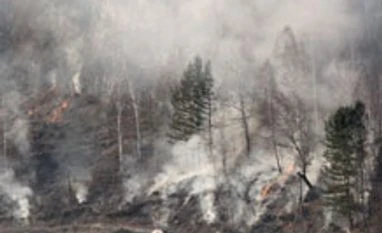Upset over a spurt in pollution in the national capital on account of crop burning by farmers in Delhi and northern states, the National Green Tribunal (NGT) on Wednesday asked states to notify steps to check the menace and imposed fines on farmers indulging in such activities. The fines ranged from Rs 2,500 to Rs 15,000. It asked the governments of Punjab, Haryana, Uttar Pradesh, Rajasthan and Delhi to issue notifications in this regard.
Observing it was a serious issue which contributed to global warming and environmental pollution, the green panel said any existing notification by the state governments should be properly complied with.
"You are putting the life of people and children at danger and they are getting sick. You cannot allow them to suffer," a bench headed by NGT chairperson Swatanter Kumar said.
The court's observation came after the counsel for the petitioner argued that the website of Delhi Pollution Control Committee showed particulate matter (PM) in Delhi to be at 460 mg per cubic metre at 10 pm on Tuesday, as against a maximum permissible limit of 60 mg.
An image taken on October 30 from a space satellite by America's National Aeronautics and Space Administration shows red outlines indicating fires burning across large swathes of Punjab and Haryana.
Farmers burn paddy to help prepare the soil for the next crop because the practice releases nutrients back into the ground and helps with pest control. But, some experts dispute this. According to them, this causes pollution, soil erosion and reduction in nitrogen content in the soil.
The court, however, noted Delhi and the four states have not been able to provide proper incentives to farmers which could prevent agricultural residue burning. The court also noted September has been the hottest month in 136 years.
Observing it was a serious issue which contributed to global warming and environmental pollution, the green panel said any existing notification by the state governments should be properly complied with.
"You are putting the life of people and children at danger and they are getting sick. You cannot allow them to suffer," a bench headed by NGT chairperson Swatanter Kumar said.
More From This Section
NGT asked district magistrates of the respective areas to constitute a taskforce to stop crop burning, seeking an action taken report. The bureaucrats have been asked to send the report to the respective state pollution boards.
The court's observation came after the counsel for the petitioner argued that the website of Delhi Pollution Control Committee showed particulate matter (PM) in Delhi to be at 460 mg per cubic metre at 10 pm on Tuesday, as against a maximum permissible limit of 60 mg.
An image taken on October 30 from a space satellite by America's National Aeronautics and Space Administration shows red outlines indicating fires burning across large swathes of Punjab and Haryana.
Farmers burn paddy to help prepare the soil for the next crop because the practice releases nutrients back into the ground and helps with pest control. But, some experts dispute this. According to them, this causes pollution, soil erosion and reduction in nitrogen content in the soil.
The court, however, noted Delhi and the four states have not been able to provide proper incentives to farmers which could prevent agricultural residue burning. The court also noted September has been the hottest month in 136 years.
)